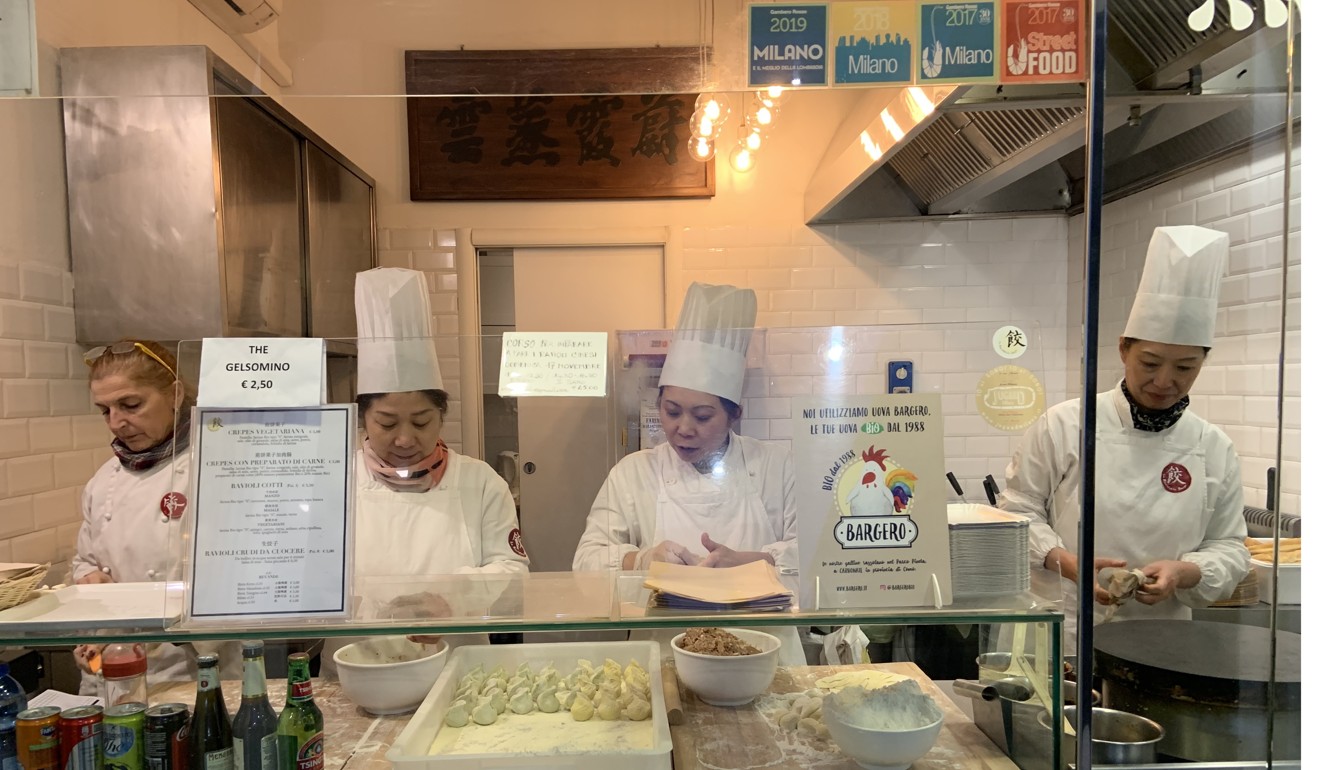
Chinese baristas stir up Italy’s purist coffee culture in face of racism and violent crime
- More Chinese entrepreneurs buy neighbourhood coffee bars in Italy as children of Italians opt out of family businesses
- Expert says some Italians believe Chinese are taking over a key part of their culture
“Chinese bars are everywhere, and the cappuccino is in a state of shock”. So go the translated lyrics of a slightly xenophobic 2013 Italian pop song by the Milanese duo “Il Genio” about Chinese migrants taking over neighbourhood cafes in northern and central Italy.
Six years later and according to an article in the Italian newspaper Corriere della Sera earlier this month, 11.5 per cent of bars in Milan are now run by first and second-generation migrants from China.
The Chinese first arrived in Milan around 80 years ago and the city has a flourishing and rather chic Chinatown selling some of the best Chinese food outside China, adding a touch of Italian panache to dim sum.
The Chinese who run coffee bars are not new arrivals to Italy
But now, the transcultural tables are turning again, and the Chinese, with their traditional family values, are stepping in to save the “piazza” bar, operating the coffee machines that have been an essential part of Italian life for decades.
They are slowly taking the place of Italian migrants from the south of Italy who started the espresso and cappuccino culture in the north in the 1960s, says Grazia Deng, who studied anthropology in Hong Kong and spent 14 months undertaking fieldwork on Chinese cappuccino culture in Bologna.
In 2019, of the 4,891 businesses registered as a bar with the city’s Chamber of Commerce, 562 are owned by Chinese people, an increase of 27 per cent since 2011.
“The Chinese who run coffee bars are not new arrivals to Italy,” explained Deng, a postdoctoral research associate at Brown University in the United States who is among the world’s leading experts on Chinese baristas in Italy.

“Most of them have already been in the country for 10 or 20 years and now they are trying to maximise their family income.”
Deng, who also studied in Shanghai, said there are two main reasons for Chinese migrants entering the neighbourhood bar business.
One, some lost their manufacturing jobs – mainly in the fashion industry – following the financial crisis. Two, the children of the first wave of migrants are now old enough to help out in the family business.
Italians, on the other hand, are leaving the neighbourhood bars – which often also sell cigarettes and food as well as coffee and alcoholic drinks.
“The children of the previous owners don’t want to stay in this business. These kids are educated and take middle class jobs – they don’t want to be baristas any more.”
With coffee selling at around a euro and a beer for just two, the neighbourhood bars are cheap, making them an essential part of working-class Italian culture, where the unemployed and elderly can hang out for several hours a day.
Many also sell confectionery and lottery tickets. Some are adding bubble tea to their menus.
“Through their willingness to work long hours and exploit flexible or unpaid family labour, these Chinese immigrant entrepreneurs allow neighbourhood businesses to carry on, even when native Italians are unwilling to take them over,” Deng said.
“Far from being ‘cultural invaders’ who threaten Italian culture, these entrepreneurs seem to have become guardians of an older way of life.”
But with racism and xenophobia on the rise all over Italy, “many Italians don’t trust the Chinese and think by running coffee bars they are taking over their culture”, Deng said.
Indeed, because of the long hours and having to work unprotected, often in high crime areas, life is not always easy for Chinese barista families.
“It can be very dangerous, and many Chinese immigrants now think coffee bars are a high-risk business,” Deng said.

In Italy there is an urban myth that “the Chinese never die”, a conspiracy theory that when Chinese immigrants pass away they do not notify the authorities, but simply pass on their documents to a new arrival.
The truth, says Deng, is that many of those who came in the late 1990s and 2000s were young and are still too young to die.
But the stabbing murder in August of a young Chinese woman working as a barista in Reggio Emilia shocked Italians and the Chinese community alike.
In what the Italian police described as a “crime of passion”, something denied by the family, 25-year-old Zhou Hui was killed in the Moulin Rouge bar where she worked by Hicham Boukssid, 34, who was staying in Italy illegally.
He had been a customer for two years and was said to have become obsessed with Zhou, who was known as Stephanie.
Hundreds of Chinese immigrants from across Italy attended the young barista’s funeral, travelling in hired coaches to attend the ceremony in a Chinese evangelical Christian church.
“If you look at the reaction from the Chinese and Italian media they reported the same thing but from different angles – they both emphasised the killer was Moroccan – but the Chinese think the Italian state doesn’t protect them,” Deng said.
Sometimes the Chinese have to protect themselves.
Earlier this month, Zhou Chaokang, the 56-year-old owner of Caffe Europeo in the Rome suburb of Cinecitta, was shot in the face after he tackled a pair of ageing armed robbers.
One of the gunmen, Ennio Proietti, 69, who had already served 30 years in prison for murder, was shot dead in the scuffle. The second gunman, Enrico Antonelli, 58, was disarmed by one of several customers who came to Zhou’s aid.
“This is our work, this is our city, me and my children will continue to work. I thank everyone who helped and are showing solidarity,” Zhou told the Rome newspaper Il Messagerro after he was discharged from hospital.
Another elderly customer described Zhou, who is a skilled martial arts practitioner, as “our Bruce Lee”.
At the weekend, Italian and Chinese businesses joined a demonstration calling for increased security in the area following the bar shoot-out.
Editor’s note: A previous version of this story referred to Reggio Emilia as a suburb of Milan. It is a city in northern Italy.

